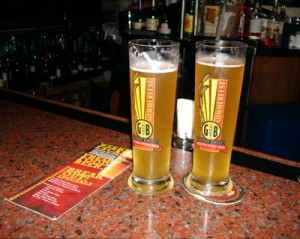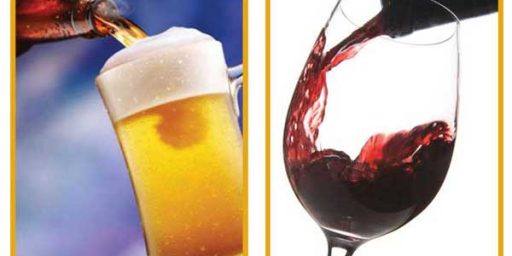Extreme Beer
Burkhard Bilger explores the rise of craft beers for The New Yorker.
“When you’re trying to create new brewing techniques and beer styles, you have to have a certain recklessness,” Jim Koch, whose Boston Beer Company brews Samuel Adams, and who coined the term “extreme beer,” told me. “Sam has that. He’s fearless, but he’s also got a good palate. He doesn’t put stuff into beer that doesn’t deserve to be there.”
The debate goes back, in one form or another, nearly five hundred years. According to the Bavarian Reinheitsgebot, or Purity Law, of 1516, beer can be made with only three ingredients: water, hops, and barley. (Yeast was left off the list because brewers didn’t know it existed; beer was naturally fermented, like sourdough bread.) German brewers still observe a version of the Reinheitsgebot, but Belgian brewers, just across the border, have cheerfully renounced it. Their krieks, wits, lambics, and gueuzes are among the world’s most remarkable beers, yet they’re often made with fruits or spices, or fortified with sugar, to become as potent as wine.
In America, brewers have long followed the German model: our major industrial breweries were all founded by German-Americans. But Calagione and others have lately wandered over to the Belgian side—and kept on going. “I’d probably be arrested, tarred and feathered, if I stepped off a plane in Berlin,” Calagione told me. Extreme brewers have helped turn American brewing into the most influential in the world. But they’ve also raised a basic question: When does beer cease to be beer?
A recent Esquire article on award winning chili recipes revealed the author’s discovering that, despite having grown up with very strict rules as to what constituted chili (no beans, etc.), “it’s all chili, and it’s all good.” The same’s basically true of beer.
Gordon Biersch, a national brewery chain with at least two locations in the DC area, has a range of terrific brews made according to the German purity laws, including an outstanding German-style hefeweitzen. But those Belgian Wits and blondes and abbey ales are terrific, too.
via Ezra Klein
The original referred to Biersch as a “local” brewery chain but, in fact, it began twenty years ago in Palo Alto, CA and is available nationally. I’d never encountered them before stopping in their DC location.





“despite having grown up with very strict rules as to what constituted chili (no beans, etc.), “it’s all chili, and it’s all good.†The same’s basically true of beer.”
Martinis, too. Most restaurants think the distinctive feature of a martini is the shape of the glass it is in, and call things a martini that have neither gin nor vermouth.
At least Belgian beer generally has all of the ingredients of beer, and then a few more.
I have a chem degree, which is the same as saying I have made beer. It might be a right of passage and/or a practical application.
I think honey-beers can be great, but haven’t met a commercial one that matched a homebrew. A simple dry cider (apple juice and champagne yeast) can be truly great, fermented in bottle … but well I haven’t really looked for a commercial version as good.
Honey beers have a great and ancient name … braggot.
I’m fairly certain that Gordon Biersch is nationwide at this point.
Beer= grains, hops, yeast, and adjuncts (anything else you want to throw in there to make it taste good) My brew buddies and I are having a blast making up recipes and a few weeks later tasting the results. Next up, a honey porter ready to keg in the weekend.
Odograph, good ciders are hard to find in the US, Strongbow is the only drinkable one I’ve found so far.
“When does beer cease to be beer?”
After it’s filtered through one’s kidneys?
As a huge Belgian beer fan I basically think Reinheitsgebot is crazy talk… but I know tons of people who turn there nose up at anything other than water, hops, and barely. That’s taste for you… I mean, yeah, some of the stuff about American breweries are doing with aging in champagne barrels and stuff is pretty gimmicky, but how can you rule out so many delicious beers?